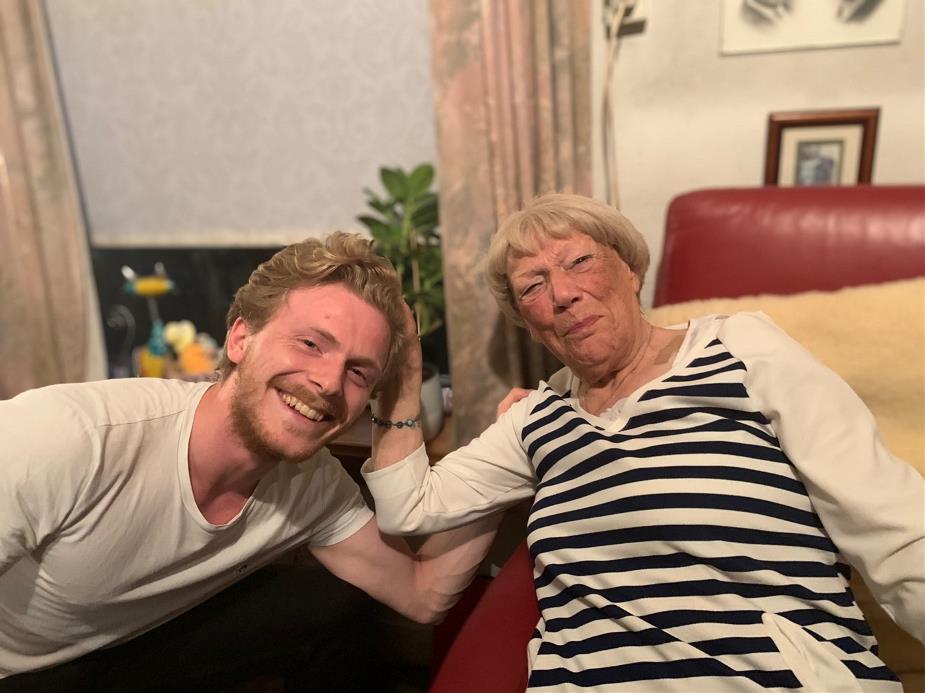How Bram links music and technology to health
31 August 2022
‘The freedom I had during this internship was fantastic and at the same time difficult.’ A word from Bram Nijhoff, a Mechatronics student.

‘The freedom I had during this internship was fantastic and at the same time difficult.’ A word from Bram Nijhoff, a Mechatronics student. During his internship in a research group - it is possible, and fun too - he thought about a musical instrument for people with dementia. He discovered that everything he had learnt during the degree programme had been very useful, and that he also struggled with an aspect that had not been addressed as much during the programme.
Bram was totally unaware that there were research teams at THUAS. When he heard in year 3 that there is a Technology for Health research group, his interest was sparked. A conversation with lecturer Luc de Witte followed and a project with Sheffield came up. That was about a musical instrument for people with dementia. Bram: ‘Everything came together perfectly. I used to find healthcare interesting anyway, and playing music is a hobby of mine. I also wanted to know how a research team works compared to a commercial business.'
Vague beginning
It was soon clear that it was different from a typical internship. ‘With a project like this, the start is vague. You don't know very much and there isn't much ready,' says Bram. At first, he had many questions. What is dementia in fact? What happens in the brain? Why would that instrument be suitable? By reading literature and visiting people with dementia - his neighbour, for example - he found answers. Ideas were also dropped. Gradually, he got closer to the core. ‘I was given the space to interpret the project as I saw fit. That freedom was really cool,’ beams Bram.
From musical instrument to interface
Bram focused on people with Alzheimer's because their motor skills do not change much. After weeks of deliberating, he decided not to develop a specific instrument, but an 'interface' that could be linked to existing instruments. ‘One instrument would not be perfect for everyone. However, this interface can be used by anyone in combination with an instrument that someone used to play, or another object that someone is familiar with. An old telephone with push buttons, for example. But I deliberately don't think about that.'
I want to make it so that it is not a problem if someone presses the key too late. No points are deducted
The idea is that the user plays along with familiar music, a bit like the computer game 'Guitar Hero'. However, there is one important difference. ‘I don't want to include the concept of failure. The challenge for me is to make it so that it doesn't matter whether the user presses the keys too late or not at all. The system will still play the music, only the main instrument will fall away at a certain point.’ It is all about activating the brain in a playful way. Research shows that a person with dementia is better able to hold a conversation after playing music.
Follow-up needed
What Bram delivers - the interface - is a combination of hardware and software, a system. Not something you can put on the lap of a person with Alzheimer's. ‘After me, someone else has to develop it further. I define the system and what is behind it. I indicate that within these frameworks, these things need to be tackled and that this is possible if it looks like this, but also: how does the system play the music, how is it displayed, where does that interaction piece come in?' Ultimately, that interface does its work in the background and there are animations in the foreground.
Working together with the customer
And then there was that aspect that Bram struggled with. What was that? ‘It’s really very important that you start talking to people who know what’s needed. I didn't know that was so important. In our school projects, we deliver great technical things, but it is pretty much spelled out. We are given a list of requirements and the lecturer says that it is very cool if we add something extra. I understand that it's not always possible during the degree programme, but I would like to work more with the customer.’
Mechatronics: nice, broad degree programme
Bram likes to learn about many different topics. The Mechatronics degree programme is wonderfully broad and therefore suits him well. ‘I'm not equally good at everything, of course, but I do like everything. I find it easy to carry out mechanical calculations. That can involve programming, which is why I like it. During this internship, I learned to programme optimally by, when possible, copying existing code from the internet and adapting it to what you already have in your script. You only write it yourself if you can't find anything suitable. That’s perfect when time is limited.’
That, that or something else entirely
After the summer, Bram will start his final year, which includes a graduation internship. He has not yet decided whether he will continue with the interface he is about to deliver. He likes it, but that nanotechnology business - where he did his previous internship - is also tempting. ‘They had a nano printer there. It prints particles of 1 millionth of a metre on a platform. Very cool. I could also do an assignment there.’ Or it will be something else entirely. Something abroad, for example. As I have already said: Bram does not like to specialise. He would rather learn everything.
Do you like technology and, like Bram, do you like a lot of different things? Would you like to design a mechanical system? See the Mechatronics website of The Hague University of Applied Sciences.